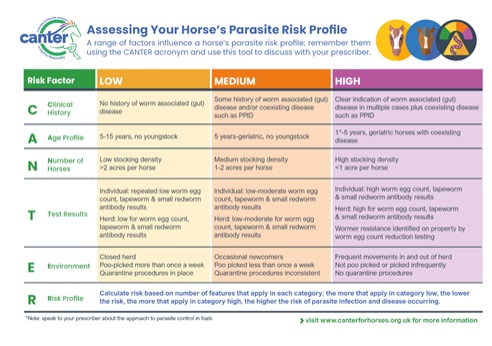As autumn arrives, Westgate Labs is calling on horse owners to put their horse’s health first by reviewing parasite control and carrying out a worm egg count. The Horse First. Every Time. Every Season. campaign highlights the importance of tailoring parasite programmes to individual horses, protecting both their wellbeing and the effectiveness of vital worming medicines for the future. The importance is compounded by the unusually dry summer weather we’ve experienced in the UK.
Not all horses carry the same parasite risk. Age, grazing conditions, and management practices all influence whether a horse is low, medium, or high risk of parasite infection. This autumn, the laboratory has seen an increased number of worm egg count results necessitating treatment, with weather conditions a likely contributing factor.
“Many owners are surprised by the factors that can affect a horse’s parasite risk,” explains Westgate Labs Director, Kristy Hodgson. “In our experience, anything that adds extra pressure on the body, whether that’s underlying illness or environmental conditions, can make it harder for horses to cope with parasite challenge. Add in reduced grazing quality – so many paddocks have been completely burnt off this summer – that horses are cropping nearer to the ground and closer to dung piles to find forage, and the chances of infection are likely to rise.
“Regular worm egg counts and tests, supported by risk assessment and good field management like poo picking, really help. Monitoring egg shedding means treatments are only used when necessary. That reduces costs for the owner, supports horse health, and helps slow the spread of anthelmintic resistance across the equine population.”

Westgate Labs supports use of the CANTER risk profiling tool, developed by the pan-industry group, Controlling ANTiparasitic resistance in Equines Responsibly, which helps owners understand whether their horse is low, medium or high risk of parasite infection. By using this framework to inform a test-based parasite control plan, Westgate helps owners build a tailored programme for their horse before reaching for a wormer.
A Case in Point
Anna, a dressage rider from Northumberland, shares how using test-based parasite control, supported by CANTER risk profiling, has transformed her approach with her horse, Roo. Categorised as low risk, Roo follows a simple programme of quarterly worm egg counts and twice-yearly tapeworm tests, addressing potential encysted redworm in the late autumn/winter by testing and/or treating. He only receives treatment when test results show it’s needed, protecting him from unnecessary medication while keeping him competition-ready.
“The support from Westgate Labs has been simple, understandable, and really reassuring,” says Anna. “I know I’m making the right decisions for Roo, and I’m also helping to preserve worming medicines for the wider horse population.”
Take Action This Season
Westgate Labs is urging horse owners to start autumn on the right track:
- Carry out a free risk assessment to understand your horse’s parasite profile.
- Worm egg count all horses to test before you treat.
- Build a parasite control programme that works for your horse, not against resistance.
For more than 25 years Westgate Laboratories has been leading the field in helping horse owners to manage the parasite control of their horses and other grazing animals. The laboratory offers a quick, easy to use, great value postal worm count and testing service that enables carers and keepers to target the wormers given to horses and keep them as healthy as possible. The laboratory employees a team of 15 people and is based on the family farm near Morpeth in Northumberland.
